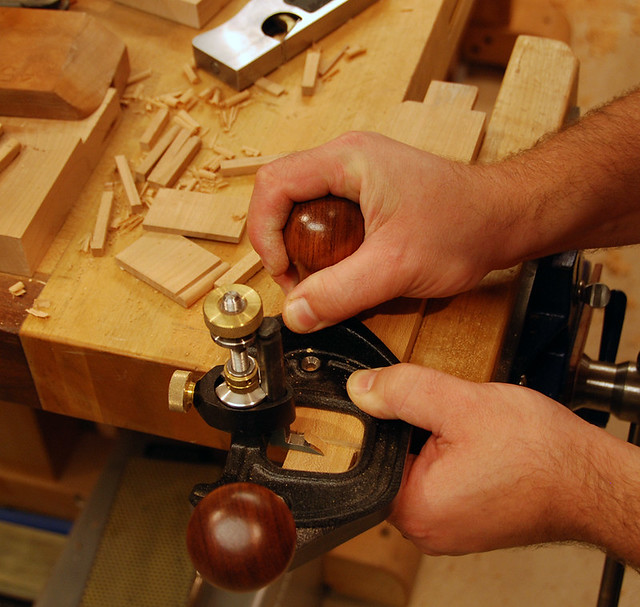My first job was in a machine shop in that experience I learned that a machinist will create a true surface or start from a previously trued surface. In woodworking you are creating a trued surface and progressing from there, each tool provides a range of capabilities and will either true a surface or work off a trued surface (or both).
An experienced woodworker is likely to have an in-depth understanding of this and how he can work with it, check it for flatness and so on, where an amateur who is in the beginnings of this hobby may not even be able to discern a truly flat surface from one that is not quite flat, so he is more likely to feel he needs to reach for a tool more capable of providing a trued surface than one that relies on his ability to create one. An experienced woodworker is also likely to have a very well equipped shop, even though often times he may not need to rely on anything other than marking tools and a set of chisels, the amateur however may feel disadvantaged because he has neither the breadth or knowledge nor the tool chest of someone more experienced. His first steps may be to buy the tools, since it's half of the process.
There is no need to fault someone for wanting to equip their shop with the tools they may find themselves to need, it's no more ill advised than the expert who continues to collect tools with a diminishing set of tasks that each tool can accomplish. Their reasoning is not that different, they both want to accomplish something with less struggle than previously required.
Also, there is a side benefit to the amateur's interest in all of this; I'd be willing to bet that companies like LN and LV are selling much more often to amateurs than experienced professionals, driving their ability to further provide the engineering and capital required to issue more and more redesigns of vintage tools. The rare tools bought up by experts only exist because LN and LV sell a lot of jack planes and panel saws.
Bumbling forward into the unknown.





 Reply With Quote
Reply With Quote
 Power to the user that can find more ways in doing the task with the tools at hand!
Power to the user that can find more ways in doing the task with the tools at hand!
 ) I've had to pull 4 engines in the past year with a friend(keeps blowing engines) with nothing more then a breaker bar, a few sockets, and our arms. We are able to pull a subaru engine out in about 30 minutes to an hour and a half depending how stupid we act(dropping the hood on each other, tying shoes laces to the car, and trips to the first aid bin) but when we do it at the junk yard it takes us an hour and a half up to 4 hours and a lot of 4 letter words. I know wood working and working on cars are two different beast but drawing from that experience I would rather be at home with my air compressor and cherry picker getting it done and having fun over being at a junk yard with nothing but basic tools and brute strength aided with the lubrication of 4 letter words.
) I've had to pull 4 engines in the past year with a friend(keeps blowing engines) with nothing more then a breaker bar, a few sockets, and our arms. We are able to pull a subaru engine out in about 30 minutes to an hour and a half depending how stupid we act(dropping the hood on each other, tying shoes laces to the car, and trips to the first aid bin) but when we do it at the junk yard it takes us an hour and a half up to 4 hours and a lot of 4 letter words. I know wood working and working on cars are two different beast but drawing from that experience I would rather be at home with my air compressor and cherry picker getting it done and having fun over being at a junk yard with nothing but basic tools and brute strength aided with the lubrication of 4 letter words. 





